Fleurs du Mal Magazine


Clive Branson (1907–1944) was born in Ahmednagar, India, the son of a major in the Indian army.
He studied at the Slade School of Art and exhibited at the Royal Academy when he was just 23. Five of his paintings are today in the Tate. His daughter is the painter Rosa Branson.
 In 1932 Branson joined the Communist Party. He taught for the National Council of Labour Colleges, spoke at weekly open-air meetings on Clapham Common and with his wife Noreen managed a Party bookshop. He took a leading role in driving Mosley’s British Union of Fascists out of Battersea, was responsible for the formation of a local Aid Spain Committee and fought with the International Brigades in Spain.
In 1932 Branson joined the Communist Party. He taught for the National Council of Labour Colleges, spoke at weekly open-air meetings on Clapham Common and with his wife Noreen managed a Party bookshop. He took a leading role in driving Mosley’s British Union of Fascists out of Battersea, was responsible for the formation of a local Aid Spain Committee and fought with the International Brigades in Spain.
Taken prisoner at Calaceite, he spent eight months in Franco’s prison camps. After he was repatriated, Branson toured Britain raising money and support for the Spanish Republic. During the Blitz he painted Battersea street-scenes for the Artists International Association. Conscripted in 1941, he served as a tank commander in the Royal Armoured Corps. He was killed in action in Burma, aged just 36.
The Selected Poems of Clive Branson brings together, for the first time, the best of his surviving poetry. Passionate and committed, it’s a first-hand account of the most violent years of the twentieth-century – Britain in the Slump, Spain during the civil-war, Fascist prisons, the London Blitz, the cultural shock of India and its poverty, the war against Japan – recorded with a painterly eye and a communist faith in the power of the people.
Richard Knott (Editor) is a writer and poet. He has written extensively on aspects of modern history, including the experience of war artists (The Sketchbook War); war correspondents (The Trio); and most recently the surveillance of writers and artists by the Security Services over three decades: (The Secret War Against the Arts). He has also published two collections of poetry.
On Being Questioned After Capture: Alcaniz
I stood before my questioner who asked
‘Why leave home?
Why have you come?
Why?’ He must have guessed
‘Because he is a Communist.’
I thought of all the answers I could give
whether death is correct or whether to save
life for a rainy day
and told a lie to cheat his bullet with a word
to use a bullet afterward
On him the bigger lie – a conscript
‘volunteer’ to rape Spain where she slept
to save his own skin
he had come when he sought ‘The Leader’ on his hands and
knees
To crush a thousand years in half an hour
To make Guernica
a wilderness.
I could wait and so could lie
for adjournment to another court
meanwhile to live on my bended knee
to make occasion for another start.
I could imitate the victor, cringe
till I and the world beyond
take our revenge.
1939
Clive Branson
(1907–1944)
Selected Poems of Clive Branson
Edited by Richard Knott
Paperback
Release date: 01 May, 2023
Publisher: Smokestack Books
Language: English
122 pages
ISBN-10:1739173007
ISBN-13:978-1739173005
Price: £8.99
• fleursdumal.nl magazine
More in: #Editors Choice Archiv, *War Poetry Archive, - Book News, - Bookstores, Archive A-B
November 2026. De Franse presidentsverkiezingen komen er weer aan, de zittende president kan na zijn tweede termijn niet worden herkozen, dus het hele veld ligt open en radicaal rechts maakt een goede kans.
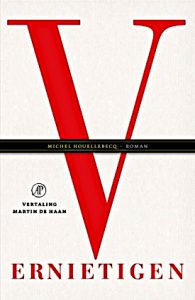 Dan verschijnt er op internet een onmogelijk realistische nepvideo waarin een van de voornaamste kandidaten wordt geëxecuteerd. De verantwoordelijkheid voor het onderzoek komt terecht bij topambtenaar Paul Raison, en over hem gaat dit boek: over zijn pogingen om een grote terroristische dreiging te pareren, maar vooral ook over zijn privéleven, zijn relatie met zijn vrouw, zijn familie.
Dan verschijnt er op internet een onmogelijk realistische nepvideo waarin een van de voornaamste kandidaten wordt geëxecuteerd. De verantwoordelijkheid voor het onderzoek komt terecht bij topambtenaar Paul Raison, en over hem gaat dit boek: over zijn pogingen om een grote terroristische dreiging te pareren, maar vooral ook over zijn privéleven, zijn relatie met zijn vrouw, zijn familie.
Michel Houellebecq (1958) is Frankrijks onbetwiste sterschrijver van dit moment. Hij publiceerde essays en poëzie voordat hij zich in 1994 met de roman De wereld als markt en strijd, die bekroond werd met diverse prijzen, opwierp als belofte van de Franse letteren. Die status bevestigde hij met Elementaire deeltjes (Prix Novembre en Impact Dublin Literary Award), dat hem terecht de faam van groot schrijver bezorgde, en Platform. In 2011, 2015 en 2019 verschenen zijn grote romans De kaart en het gebied, Onderworpen en Serotonine. In juni 2022 verscheen een nieuwe editie van zijn essays onder de titel Nader tot de ontreddering. Zijn veelvuldig bekroonde en wereldwijd vertaalde werk is in het Nederlands vertaald door Martin de Haan.
Vernietigen
Michel Houellebecq
Roman
Vertaling: Martin de Haan
Nederlands
Uitgeverij De Arbeiderspers
Hardcover
2023
608 pagina’s
EAN 9789029545884
€29,99
• fleursdumal.nl magazine
More in: - Book News, - Bookstores, Archive G-H, Archive G-H, AUDIO, CINEMA, RADIO & TV, Erotic literature, Michel Houellebecq
Het Incident
Geachte Heer en Mevrouw Waasdorp,
Via deze weg wil ik graag nog even terugkomen op het incident van 13 november jongstleden.
Het spijt ons –ik moet hier specifiek Mevr. Van Eeken, onze gewaardeerde docent Aardrijkskunde, ook niet onbenoemd laten- ten zeerste dat wat begon als een klein voorval, zo uit de hand kon lopen. In het verlengde hiervan doet het ons zeer veel verdriet dat de schorsing van uw zoon Wesley dan ook niet vermeden kon worden.
Als school staan we ontegenzeggelijk voor goed onderwijs, maar vooral ook voor inclusie, we vormen immers het voorportaal van de maatschappij. Het feit dat Wesley in zijn periode van schorsing niet deel kan nemen aan het onderwijs –en in feite dus aan de maatschappij – raakt óók ons diep in ons onderwijshart.
In het gesprek wat we 15 november hebben gevoerd op school was er achteraf gezien iets teveel emotie om objectief te bespreken wat er nou daadwerkelijk was gebeurd. Om die reden vinden we het belangrijk om middels deze brief enkele –in onze bescheiden optiek- onderbelichte aspecten nog eens aan te stippen.
Laat ik voorop stellen dat Wesley een immer aanwezige leerling is binnen de muren van onze scholengemeenschap. Een energieke jongen die door docenten vooral omschreven wordt als vindingrijk en sociaal georiënteerd. Iemand die zelden tot nooit ziek is en nooit te beroerd is om zijn mening in de klas te geven. Iets wat wij als voorstanders van dialoog en debat alleen maar kunnen toejuichen.
Natuurlijk, hij is wel eens betrokken geweest bij vechtpartijen, pesterijen, enkele bewezen gevallen van fraude bij schoolexamens en drugshandel op school. Maar laten we geen oude koeien uit de sloot halen. Voor het laatste heeft hij overigens zijn straf al gehad toen hij drie maanden in detentie zat in Sassenheim. Ook toen was Wesley een lange periode verstoken van (goed) onderwijs. In dat opzicht kunnen we stellen dat de huidige situatie ons des te meer zorgen baart.
Ik kan me niet voorstellen dat Wesley thuis wel inzet toont en een wezenlijke bijdrage aan bijvoorbeeld het huishouden levert. Zelfs een bordje naar de keuken brengen is waarschijnlijk al teveel gevraagd. Op school herkennen we dat wel. Als we hem vriendelijk vragen om een geleend boek terug te leggen in de kast wenst hij ons steevast allerhande ziektes toe, waarbij we vooral de rattentyfus en de grafebola niet onbenoemd willen laten. Wenst hij u deze creatieve ziektes ook toe als u hem vraagt een kommetje kerriesoep weer op het aanrecht te zetten? Van meehelpen in het huishouden kan geen sprake zijn. U zou het eigenlijk beter tegenwerken van het huishouden kunnen noemen als u eerlijk bent. Dat brengt me eigenlijk meteen terug naar de kern: Eerlijkheid. Daar schort het toch wel een beetje aan bij Wesley. Mag ik dat zeggen? De wijze waarop hij de ene na de andere leugen schijnbaar zonder enige moeite tussen zijn ongepoetste tanden door laat glippen, is even onbeschoft als zorgwekkend te noemen. Maar dit terzijde.
Laten we nog even terug gaan naar die bewuste middag vorige week. Ik zal de situatie zo objectief mogelijk trachten te schetsen.
Wesley kwam (wederom) tien minuten te laat in de les bij mevr. Van Eeken. Volgens zijn zeggen was hij vanwege een toiletbezoek te laat. Dat leek Mevr. Van Eeken wat overdreven en zij heeft mij telefonisch op de hoogte gesteld. We hebben polshoogte genomen bij de toiletten op de eerste verdieping en troffen daar op de muur een onrealistisch groot getekende jongeheer aan. Met veel aandacht –als ik een hang naar drama had, zou ik “liefde” zeggen- met zwarte watervaste stift op de muur gekalkt. Precies zo’n marker vonden we in de tas van Wesley. Helemaal bewijzen kunnen we het uiteraard niet maar het riekt er toch wel naar dat Wesley deze kunstuiting op zijn palmares kan schrijven. Op ingeleverd werk vonden we immers tekeningen die ernstige overeenkomsten vertoonden met het kunstwerk in de toiletten. Hier was verder forensisch sporenonderzoek in onze optiek dan ook overbodig. Overigens konden we in het toilet niet de kenmerkende geur van Wesley’s uitwerpselen waarnemen, wat de achterdocht jegens Wesley’s vermeende onschuld deed groeien.
Enfin, Wesley was na deze betichting onzer zijde zo verbolgen dat er geen spreekwoordelijk land meer mee te bezeilen was. De woorden die hij hierbij gebruikte kan ik lastig herhalen, maar kwamen er op neer dat Mevr. Van Eeken de betreffende marker in haar vleesportemonnee kon opbergen. Volgens Mevrouw Van Eeken was dit verzoek gekoppeld aan een irreëel verwachtingspatroon en leek bovendien fysiek onhaalbaar gezien de medische status van Mevrouw Van Eeken. Wesley maakte hier op onvolwassen wijze misbruik van de uitgelekte kennis betreffende mevrouw Van Eeken’s recente operatie in de onderste regionen. Hoewel uitgelekt hier misschien een onhandig gekozen term is.
Toegegeven, iedereen verdient een tweede kans, maar over een eventuele zesentwintigste kans zijn de kaarten wat mij betreft nog niet geschud. Ik heb hier echter weinig over te zeggen zolang het Bestuur van mening is dat we leerlingen niet kunnen verwijderen voordat we op zijn minst van doodslag kunnen spreken. Ik kan wel verklappen dat het voltallige docentencorps er in hoge mate tegenop ziet om het kadaver dat Wesley genoemd wordt, weer met zijn beschimmelde blik door het schoolgebouw te zien struinen. Wat hij hier komt halen weet dan ook geen mens. Het zou mooi zijn als er een beroep zou zijn waar het tekenen van strakke plassers tot de kerntaken behoort, maar zolang dat er niet is, zien we het somber in wat betreft de toekomstkansen van Wesley.
Ik zou deze brief kunnen besluiten met de verwachting uit te spreken dat het vanaf nu anders zal gaan, maar we weten allemaal wel beter. Waarschijnlijk spreken we elkaar binnen luttele dagen om het volgende incident te bespreken. We kunnen enkel hopen dat jullie dan als gezin iets meer gewassen ten tonele zult verschijnen. De exotische mengeling van even grote delen knoflook, opgedroogd zweet en iets wat ik enkel kan omschrijven als menselijke ontlasting, is vrees ik in het leer van onze fauteuils getrokken om erin te blijven wonen.
Hoogachtend,
Drs. J. Schuddetrut
Rector O.S.G. Balthasar Gerards
Tekst: Thomas van der Vliet
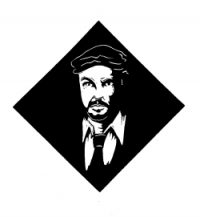 Thomas van der Vliet is van oorsprong een muzikant. Hij heeft met zijn band The Bullfight in 2022 nationaal hoge ogen gegooid (**** – Volkskrant) met het spoken word album Some Divine Gift, waarbij hij gedichten en korte verhalen van onder andere Barry Hay, Spinvis, Alex Roeka en David Boulter (Tindersticks) op muziek heeft gezet.
Thomas van der Vliet is van oorsprong een muzikant. Hij heeft met zijn band The Bullfight in 2022 nationaal hoge ogen gegooid (**** – Volkskrant) met het spoken word album Some Divine Gift, waarbij hij gedichten en korte verhalen van onder andere Barry Hay, Spinvis, Alex Roeka en David Boulter (Tindersticks) op muziek heeft gezet.
Als schrijver was Van der Vliet eerder betrokken bij educatieve uitgaven (Uitgeverij SWP) en als scenarist voor een korte film voor het Rotterdams Film Festival.
In 2024 verschijnt zijn romandebuut Het Interview via Uitgeverij Studio Kers. Naast de gedrukte versie zal een audioboek beschikbaar komen, ingesproken door muzikant Alex Roeka en van soundtrack voorzien door Van der Vliet’s band The Bullfight.
(linosnede door Hélène Bautista)
• fleursdumal.nl magazine
More in: # Music Archive, #Short Stories Archive, Archive U-V
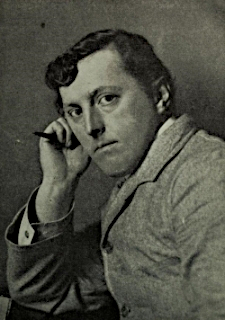
To a Lost Love
I cannot look upon thy grave,
Though there the rose is sweet:
Better to hear the long wave wash
These wastes about my feet!
Shall I take comfort? Dost thou live
A spirit, though afar,
With a deep hush about thee, like
The stillness round a star?
Oh, thou art cold! In that high sphere
Thou art a thing apart,
Losing in saner happiness
This madness of the heart.
And yet, at times, thou still shalt feel
A passing breath, a pain;
Disturb’d, as though a door in heaven
Had oped and closed again.
And thou shalt shiver, while the hymns,
The solemn hymns, shall cease;
A moment half remember me:
Then turn away to peace.
But oh, for evermore thy look,
Thy laugh, thy charm, thy tone,
Thy sweet and wayward earthliness,
Dear trivial things, are gone!
Therefore I look not on thy grave,
Though there the rose is sweet;
But rather hear the loud wave wash
These wastes about my feet.
Stephen Phillips
(1864 – 1915)
To a Lost Love
• fleursdumal.nl magazine
More in: #Editors Choice Archiv, Archive O-P, Archive O-P
Like a long, funny letter from an old friend, an album of drawings by the legendary singer and activist for social justice, Joan Baez.
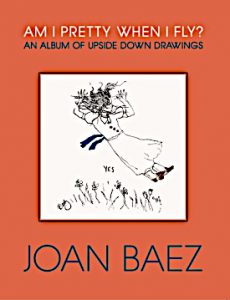 Since retiring from active performing, Baez has focused her formidable talents on painting and drawing. This collection of drawings shows another side of Baez: lovingly loose and charming sketches on reoccurring themes such as politics, relationships, women, animals, and family.
Since retiring from active performing, Baez has focused her formidable talents on painting and drawing. This collection of drawings shows another side of Baez: lovingly loose and charming sketches on reoccurring themes such as politics, relationships, women, animals, and family.
Each section, organized thematically, includes an introductory piece by the artist. Baez approaches her line drawings as exercises in freedom: she begins drawing upside down—often using her non-dominant hand—without any preconceived notion of where the lines might lead her.
Beginning with her seminal debut album in 1960, Baez has been a musical force of nature of incalculable influence whose earliest recordings fed a host of traditional ballads into the rock vernacular.
In 1963, she introduced Bob Dylan to the world, beginning a tradition of mutual mentoring that continued across her many recordings.
As a lifetime advocate for non-violent social change, she marched on the front line of the civil rights movement with Martin Luther King Jr., shined a spotlight on the Free Speech Movement, took to the fields with Cesar Chavez, organized resistance to the Vietnam War, and inspired Vaclav Havel in his fight for a Czech Republic.
Joan Baez is a dynamic force of nature. Her commitment to music and social activism has earned global recognition, ranging from induction into the Rock & Roll Hall of Fame, to the Ambassador of Conscience Award, Amnesty International’s highest honor. Retired from active performing since 2019, she has devoted much of her time to the “Mischief Makers” series of paintings, portraits that immortalize risk-taking visionaries she has known, who have brought about social change through history, from Dr. Martin Luther King and Bob Dylan to the Dalai Lama and Patti Smith.
Am I Pretty When I Fly?:
An Album of Upside Down Drawings
by Joan Baez
Publisher: David R. Godine
Published: 2023
Language: English
Hardcover
120 pages
ISBN-10: 567927548
ISBN-13: 978-1567927542
$40.50
• fleursdumal.nl magazine
More in: - Book News, - Bookstores, Archive A-B, Archive A-B, AUDIO, CINEMA, RADIO & TV, Bob Dylan, Joan Baez, Patti Smith
Neuf récits composent La frontière des oubliés et retracent le parcours de l’écrivaine, depuis sa fuite, enfant, de la frontière afghane pour se bâtir une vie à Téhéran.
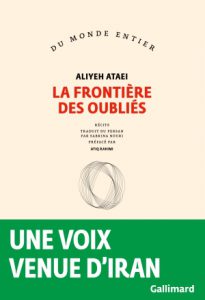 Dans chacune de ces vignettes de vie qui se font écho, elle brosse le portrait de ses compatriotes exilés, des « frontaliers », souvent des femmes, qui portent tous des traces de la guerre, des plaies profondes marquées par des balles invisibles.
Dans chacune de ces vignettes de vie qui se font écho, elle brosse le portrait de ses compatriotes exilés, des « frontaliers », souvent des femmes, qui portent tous des traces de la guerre, des plaies profondes marquées par des balles invisibles.
À chaque rencontre, elle s’interroge sur la violence, l’exil et l’identité. Et en s’imprégnant de son propre vécu, Aliyeh Ataei embrasse ici plus largement le sort de tous ceux qui ont hérité des « chromosomes-douleurs », se faisant l’écho de leurs voix si peu audibles.
La frontière des oubliés nous fait découvrir une nouvelle plume puissante venue d’Iran. De son style clair et tranchant, Aliyeh Ataei dévoile des vérités qui secouent, et bouleversent.
Aliyeh Ataei
La frontière des oubliés
[Koorsorkhi]
Trad. du persan par Sabrina Nouri. Préface d’Atiq Rahimi
Collection Du monde entier, Gallimard
Parution : 13-04-2023
160 pages
140 x 205 mm
Achevé d’imprimer: 01-03-2023
ISBN: 9782073006745
Gencode: 9782073006745
Code distributeur: G07173
Livre imprimé € 18,00
• fleursdumal.nl magazine
More in: - Book News, - Bookstores, Archive A-B, REPRESSION OF WRITERS, JOURNALISTS & ARTISTS, WAR & PEACE
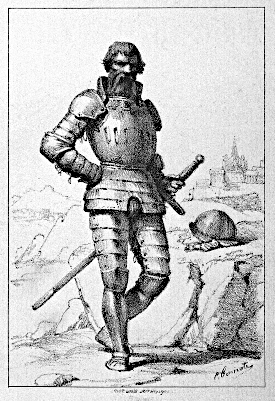
Ain new lied herr Ulrichs von Hutten
1
Ich habs gewagt mit sinnen
und trag des noch kain rew,
mag ich nit dran gewinnen,
noch muoß man spüren trew;
dar mit ich main nit aim allain,
wenn man es wolt erkennen:
dem land zuo guot, wie wol man tuot
ain pfaffenfeind mich nennen.
2
Da laß ich ieden liegen
und reden was er wil;
hett warhait ich geschwigen,
mir wären hulder vil:
nun hab ichs gsagt, bin drum verjagt,
das klag ich allen frummen,
wie wol noch ich nit weiter fliech,
villeicht werd wider kummen.
3
Umb gnad wil ich nit bitten,
die weil ich bin on schuld;
ich hett das recht gelitten,
so hindert ungeduld,
daß man mich nit nach altem sit
zuo ghör hat kummen laßen;
villeicht wils got und zwingt sie not
zuo handlen diser maßen.
4
Nun ist oft diser gleichen
geschehen auch hie vor,
daß ainer von den reichen
ain guotes spil verlor,
oft großer flam von fünklin kam,
wer waiß ob ichs werd rechen!
stat schon im lauf, so setz ich drauf:
muoß gan oder brechen!
5
Dar neben mich zuo trösten
mit guotem gwißen hab,
daß kainer von den bösten
mir eer mag brechen ab
noch sagen daß uf ainig maß
ich anders sei gegangen,
dann eren nach, hab dise sach
in guotem angefangen.
6
Wil nun ir selbs nit raten
dis frumme nation,
irs schadens sich ergatten,
als ich vermanet han,
so ist mir laid; hie mit ich schaid,
wil mengen baß die karten,
bin unverzagt, ich habs gewagt
und wil des ends erwarten.
7
Ob dann mir nach tuot denken
der curtisanen list:
ain herz last sich nit krenken,
das rechter mainung ist;
ich waiß noch vil, wöln auch ins spil
und soltens drüber sterben:
auf, landsknecht guot und reuters muot,
last Hutten nit verderben!
Ulrich von Hutten
Ritter und Dichter
(* 21.04.1488, † 29.08.1523)
Ain new lied herr Ulrichs von Hutten
• fleursdumal.nl magazine
More in: #Editors Choice Archiv, - Archive Tombeau de la jeunesse, Archive G-H, Archive G-H, Hutten, Ulrich von
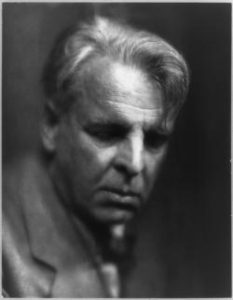
When Helen lived
We have cried in our despair
That men desert,
For some trivial affair
Or noisy, insolent sport,
Beauty that we have won
From bitterest hours;
Yet we, had we walked within
Those topless towers
Where Helen walked with her boy,
Had given but as the rest
Of the men and women of Troy,
A word and a jest.
William Butler Yeats
(1865-1939)
When Helen lived
• fleursdumal.nl magazine
More in: Archive Y-Z, Archive Y-Z, Yeats, William Butler
The poems in Mirabilia test the relationship between art and politics.
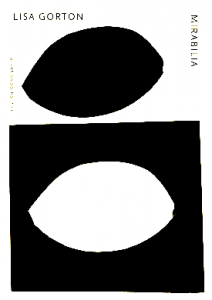 They are ekphrastic poems complicated by historical narrative; or, they are political poems, inspired by artworks. The title poem is a tribute to the pangolin, the world’s most-trafficked mammal – implicated, some say, in the evolution of coronavirus.
They are ekphrastic poems complicated by historical narrative; or, they are political poems, inspired by artworks. The title poem is a tribute to the pangolin, the world’s most-trafficked mammal – implicated, some say, in the evolution of coronavirus.
Written in Fibonacci syllabics, it is also a reflection on Marianne Moore’s poem ‘The Pangolin’, with its sense of nature’s perpetuity – lost in the years since her poem was written. The final sequence ‘Great World Atlas’ tracks the destructive extent of nuclear testing across the world in the 1960s. It was written for Izabela Pluta’s artist’s book Figures of Slippage and Oscillation.
The sequence ‘Tongue’ reflects on da Vinci’s 1478 painting The Benois Madonna, including the circumstances of its creation in the Pazzi conspiracy and the life of Fioretta del Cittadino – perhaps the painting’s model – who gave birth to the child of the murdered man.
Her child was taken; she was written out of the record. In other poems too, Gorton reflects on the experience of the female muse, wife, or mother.
Shortlisted: NSW Premier’s Literary Awards – Poetry 2023
Lisa Gorton has a PhD on the poetry of John Donne from the University of Oxford. She is a poet and novelist, essayist and reviewer. Her first poetry collection Press Release won the Victorian Premier’s Literary Award for Poetry; her second, Hotel Hyperion was awarded the Philip Hodgins Memorial Medal; and her third, Empirical, was shortlisted for the Prime Minister’s and NSW Premier’s Literary Awards for Poetry. Her novel The Life of Houses was the co-winner of the 2016 Prime Minister’s Literary Award for Fiction. She is the author of Cloudland, a novel for children.
Mirabilia
Poetry
by Lisa Gorton
Publisher: Giramondo Publishing (1 August 2022)
Language: English
Paperback: 96 pages
ISBN-10: 1922725307
ISBN-13: 978-1922725301
Dimensions: 20 x 14 x 1.5 cm
Price: aus. $ 25.00
• fleursdumal.nl magazine
More in: #Editors Choice Archiv, - Book News, - Bookstores, Archive G-H, Archive G-H
In mei 1940 is de dichter Gerrit Kouwenaar (1923-2014) zestien jaar en schrijft hij zijn eerste gedichten.
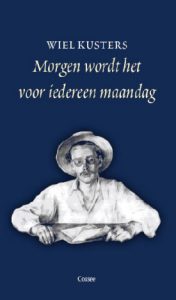 Zes jaar later en een wereldoorlog verder is hij, zonder dat nog te beseffen, op weg om een van de meest invloedrijke Vijftigers te worden.
Zes jaar later en een wereldoorlog verder is hij, zonder dat nog te beseffen, op weg om een van de meest invloedrijke Vijftigers te worden.
De Tweede Wereldoorlog, die grote ontvormer van mens en moraal, heeft hem gemaakt tot de dichter die later liever ‘men’ dan ‘ik’ schreef en die, tot zijn dood in 2014, is uitgegroeid tot een van de grootste Nederlandse dichters van de twintigste eeuw.
In zijn dankwoord bij de uitreiking van de Prijs der Nederlandse Letteren in 1989 in Brussel sprak hij over de jaren 1940-1945 als een ‘leerschool die mij heeft bijgebracht dat woorden lege hulzen zijn als ze niet gevuld worden met je eigen leven en lichaam, je eigen sterfelijkheid.’
Morgen is het voor iedereen maandag belicht op uiterst boeiende wijze de periode van de bezetting en de eerste jaren na de oorlog, wanneer de dichter als kunstredacteur in dienst is van het communistische dagblad De Waarheid. Het verhaal is doorspekt met tal van niet eerder gepubliceerde gedichten, verhaal- en brieffragmenten.
Morgen wordt het voor iedereen maandag
De oorlog van Gerrit Kouwenaar
door Wiel Kusters
Taal: NL
Cossee
Mei 2023
ISBN: 9789464520767
Hardcover
450 pagina’s
€ 39,99
• fleursdumal.nl magazine
More in: - Book News, - Bookstores, Archive K-L, Archive K-L, Gerrit Kouwenaar, Kouwenaar, Gerrit, Wiel Kusters
From acclaimed independent journalist Kevin Gosztola, this carefully-documented analysis of the government’s case against Julian Assange and its implications for press freedom acts as a crucial, compelling guidebook to Assange’s upcoming trial.
Guilty of Journalism is a joint production of The Censored Press and Seven Stories Press.
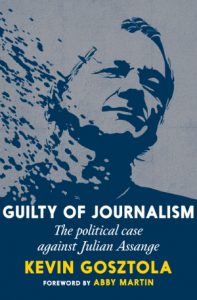 The legal action against Julian Assange is poised to culminate in a trial in the United States in 2023, and this book will help the public understand the proceedings. The establishment media’s coverage of WikiLeaks founder Julian Assange’s extradition case has focused on his deteriorating health and what CBS News called his “secret family,” but most of this coverage failed to detail the complex issues at stake against Assange.
The legal action against Julian Assange is poised to culminate in a trial in the United States in 2023, and this book will help the public understand the proceedings. The establishment media’s coverage of WikiLeaks founder Julian Assange’s extradition case has focused on his deteriorating health and what CBS News called his “secret family,” but most of this coverage failed to detail the complex issues at stake against Assange.
Guilty of Journalism outlines how WikiLeaks exposed the reality of American wars, the United States government’s unprecedented indictment against Assange as a publisher, and the media’s role in persuading the public to “shoot the messenger.”
This new book by Kevin Gosztola, who has spent the last decade covering Assange, WikiLeaks, and the wider war on whistleblowers, tells the full story based on testimony from dozens of witnesses. It examines abuses of power by the CIA and the FBI, including a spying operation that targeted Assange’s family, lawyers, and doctors. Guilty of Journalism offers a balanced and comprehensive perspective on all the events leading up to what press freedom advocates have called the trial of the century.
Kevin Gosztola has spent the last decade reporting on Assange, WikiLeaks, and the wider war on whistleblowers. He is cofounder and managing editor of Shadowproof, an independent news outlet focused on systemic abuses of power in business and government, and the curator of The Dissenter newsletter. Gosztola also produces and co-hosts the weekly podcast, “Unauthorized Disclosure.” His work has appeared in outlets such as The Nation, Salon, Common Dreams, and Truthout, and he has been a featured guest on Democracy Now!, The Real News Network, CounterSpin, and Al Jazeera English. He is coauthor of Truth and Consequences: The US vs. Bradley Manning (Sinclair Books, 2012; with Greg Mitchell).
Guilty of Journalism
The Political Case Against Julian Assange
by Kevin Gosztola
Foreword by Abby Martin
Seven Stories Press
Paperback
Publish Date: 07-03-2023
ISBN: 9781644212721
Pages: 256
$16.95
• fleursdumal.nl magazine
More in: - Book News, - Bookstores, Archive G-H, AUDIO, CINEMA, RADIO & TV, MUSEUM OF PUBLIC PROTEST, REPRESSION OF WRITERS, JOURNALISTS & ARTISTS
In Customs, Solmaz Sharif examines what it means to exist in the nowhere of the arrivals terminal, a continual series of checkpoints, officers, searches, and questionings that become a relentless experience of America.
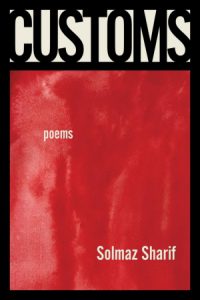 With resignation and austerity, these poems trace a pointed indoctrination to the customs of the nation-state and the English language, and the realities they impose upon the imagination, the paces they put us through.
With resignation and austerity, these poems trace a pointed indoctrination to the customs of the nation-state and the English language, and the realities they impose upon the imagination, the paces they put us through.
While Sharif critiques the culture of performed social skills and poetry itself—its foreclosures, affects, successes—she begins to write her way out to the other side of acceptability and toward freedom.
Customs is a brilliant, excoriating new collection by a poet whose unfolding works are among the groundbreaking literature of our time.
This will be the last I write of it directly, I say each time.
This is a light that lights everything and dimly.
All my waiting at this railing.
All my writing is this squint.
Solmaz Sharif is the author of a Customs and Look, which was a finalist for the National Book Award and a New York Times Notable Book. She has received a Rona Jaffe Foundation Writers’ award, a Lannan Literary Fellowship, and fellowships from the National Endowment for the Arts and the Poetry Foundation. Her poetry has appeared in Granta, the New Republic, and Poetry. She is currently the Shirley Shenker Assistant Professor of English at U.C. Berkeley. ( https://solmazsharif.com/ )
Customs: Poems
by Solmaz Sharif
86 pages
Paperback
Publisher: Graywolf Press
March 1, 2022
Language: English
Paperback: 72 pages
ISBN-10:1644450798
ISBN-13:978-1644450796
$15.99
• fleursdumal.nl magazine
More in: #Editors Choice Archiv, Archive S-T, Archive S-T
Thank you for reading Fleurs du Mal - magazine for art & literature